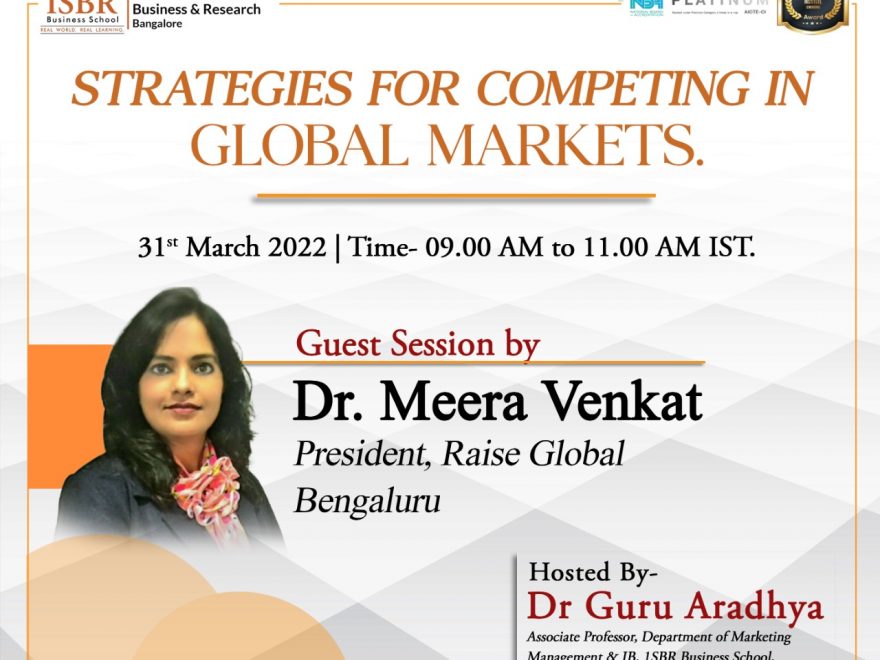Dr. Meera Venkat is globally recognized as a leading futurist, speaker, strategy advisor, and C-Suite professional. She is President of Raise Global and founded Raise Global C-Suite Thought Leaders Networks, which includes CEO, CFO, CHRO, CMO, CIO/CTO, CPO, which helps leading organizations act today to create a successful tomorrow.
Dr. Meera Venkat is the chairperson for IICCI, Karnataka and she works globally as a strategy advisor to leading organizations, SME/MSME, Funded startups. She works with C-Suite executives, boards of directors, senior executives, and strategy teams to lead and stimulate effective strategic planning and thinking. She has deep expertise in facilitating strategic thinking among executive teams, provoking valuable insights and bringing to bear high-level perspectives on the future, disruption, industry shifts and opportunities.
Dr. Meera Venkat is the President of RAISE GLOBAL, unique research-based reputation consulting firm, which works with the C Level Executives. She is the recipient of
- “Women Economic Forum Award” – 2018
- “Global Women of Excellence Award” – CIAC Global – 2018
- “Women of Substance” – NEFD Award for women – 2017
- “Business Excellence Award – 2016” by Future of India and CNBC
- “The Best Women Achiever Award” for the year 2013 by PRI. She holds the following honorary positions
- Chairperson WeLEED – Women Economic Forum
- Chairperson ISTD (Indian Society of Learning and Development), Bangalore, Karnataka
- Chairperson International IChamber of Commerce and Industry, Karnataka
Special committee – Aerospace, BCIC (Bangalore Chamber of Industry and Commerce)
Dr.Meera is a regular commentator and speaker in many forums and top colleges and universities in India, on many events and conferences. She has written and co-authored many articles in the books and magazines and also featured in many of the top news report magazines.
A guest lecture on strategies for competing in global market as a part of Strategic Management course work organized by Dr. Guru Basava Aradhya, Associate professor, Department of Marketing & International Business, ISBR Business School.
Digitalization is now giving the start-ups an opportunity to dream of globalizing. Then, she further explained the requirements for globalization. They are, Infrastructure, Business Freedom,Government support, Resources, Competition, and Orientation. Then she explained the benefits of growing global, which included, increasing profits, targeting new customers at low costs, which gives an opportunity to capitalize the core competency and resources available in specific region, and balances the demand and supply.
The various advantages of global strategy, like, free flow of capital, supply chain and logistics, increase in production, producing goods at low cost and high quality, improved economic growth, more social & cultural interaction were explained. Then she gave us some insights on different types of international strategies. They are
Multi Domestic- Different products are produced in different countries. Example: Danone, where varieties of dairy were produced for the Russian market.
Mega Multinational- Standardized products are sold globally. Example: Apple, Coca Cola, aluminum companies give their standardized products to various countries and the purpose of each country is different, like India- IT, US-Electricity, Indonesia- Labor.
Transnational: Branding and positioning are standardized, but products will be customized according to the local requirements. Example: KFC, Starbucks. Then a case study on ‘Samsung competing in the global market’ was explained for further understanding of global strategies and how firms should compete with their competitors. The case study throws light on how Samsung marketed themselves against their main rival Apple. They checked the disadvantages of Apple, and provided those missing features in Samsung to capture the market. To become the global electronic power house, it embraced the competition, enhanced the user experience, and created AD campaigns to attract the customers with their new features. Samsung, used social listening to build a community for itself and adopted many CSR practices. The case study also included the details of how Samsung coped with brand damage when their phones had battery blast issues. The company lost its money in the stock market. The Chief operating officer addressed the customers, investigators were sent out to investigate the issues, and refunds or selection of new phones were done,
where about 90% of the devices were recovered from the US.
Later, various strategies for globalization were explained. For example, franchising, export, licensing, contract manufacturing, management contract, turnkey contracts, assembly operations, mergers & acquisitions, etc. Ma’am, then explained how Asian Paints went global. Asian paints was ranked first in India and 4 th or 5 th in the world. So, it analyzed what it takes to climb up the ladder and as a result merged with few local paint companies to enter into new markets. Then various challenges for globalization were explained. Lastly, we learnt about the essential qualities required for the global leaders. Some of the qualities were, focus on results, managing risk, huger, agility, passion, listening and implementing. Then ma’am ended with a quote “Manasa Vacha Karmana”, which means, to achieve greatness you need consistency in thoughts, words and action.
LEARNINGS FROM THE EVENT
Globalization and various strategies adopted to go global.
How to compete in a global market.
The essential skills required to be a global leader.
FEEDBACK FROM STUDENTS
The students had an interactive and a great experience in this session. They understood various aspects of strategies implemented in global markets from the industry’s point of view and also realized how vital they are in the global community we live in. the session was very insightful for budding entrepreneurs and managers.
About ISBR: ISBR Business School, Bangalore-based, Top Class B School for PGDM or MBA, Consistently ranked as best B School in India, AICTE-CII Platinum Category, with multiple specializations.

